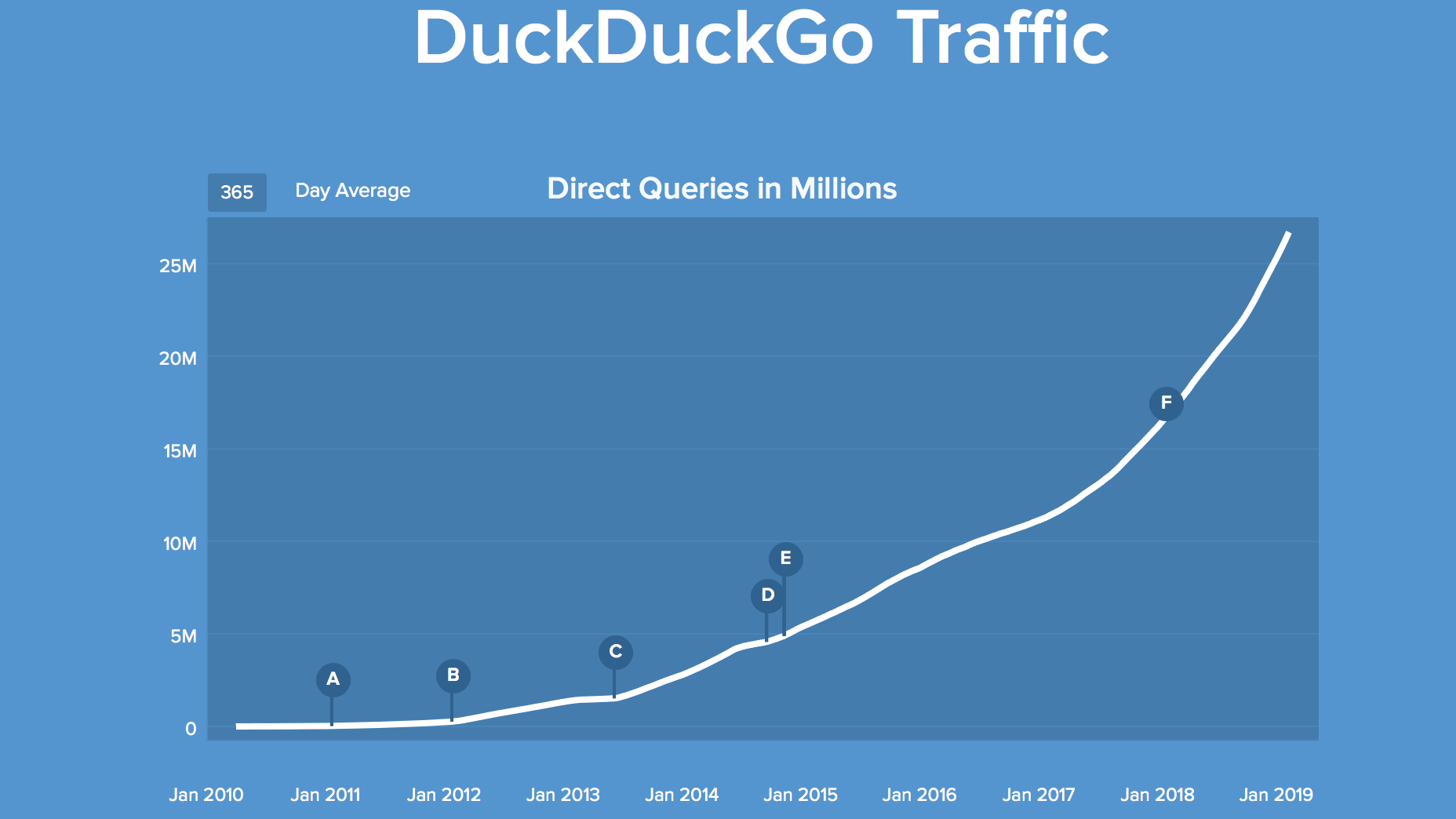Why DuckDuckGo matters
The growth of DuckDuckGo suggests users are in the market for a platform whose value proposition is built on protecting privacy.
DuckDuckGo is the little engine that could. The platform, which touts its ability to protect users’ privacy, recently said that it experienced surging year-over-year user traffic for 2018 and that it is already on pace for even stronger search usage in 2019. Also, Apple and DuckDuckGo formed a partnership to use Apple Maps as the default for sharing businesses’ location data in search results. But does DuckDuckGo matter to businesses? After all, the 9 billion user searches on DuckDuckGo for 2018 are dwarfed by the one trillion searches conducted on Google each year.
I believe the answer is yes: DuckDuckGo matters as a privacy litmus test.
The rise of DuckDuckGo
DuckDuckGo has been gaining more attention from mainstream media because of the company’s value proposition, which is clear to anyone who visits the search engine. “The search engine that doesn’t track you.” DuckDuckGo promises that using the search engine means taking back your privacy. For instance, DuckDuckGo does not store users’ personal information, follow them around with ads, or track them. At a time when personal privacy has become on a defining topic, DuckDuckGo has increasingly captured the attention of the news media.
But even though DuckDuckGo might seem like a new phenomenon, the company has been around for ten years, and anonymous tracking is only one of its features. For example, DuckDuckGo introduced voice search for users of the Google Chrome voice search extension in 2011. And the DuckDuckGo Instant Answers feature pulls from a variety of content sources to provide no-click answers or information that is so complete that users don’t need to click on the search results to get what they need. Also, DuckDuckGo touts its transparency, making it easy for anyone to keep up to date on user search volume.
At the same time, DuckDuckGo is not a nonprofit. It’s a business. The company says it makes money through advertising and affiliate revenue, such as sponsored links (syndicated through Yahoo!) that appear above search results. DuckDuckGo also gains income through affiliate programs with Amazon and eBay. And DuckDuckGo vows to make money while protecting user privacy at the same time – making it a natural fit for Apple Maps, which operates under a similar principle.
The privacy debate
But is DuckDuckGo’s focus on protecting user data a strong enough value proposition that brands should pay closer attention to the company’s growth? On the one hand, the growth of DuckDuckGo is undeniable. It’s hard to argue with an increase in search activity that looks like this:
This growth is occurring at a time of heightened public interest in personal privacy. A recent Pew survey indicates that more than half of adult users of Facebook adjusted their Facebook privacy settings in light of the privacy scandals that rocked the world’s largest social network in 2018. And a recent RSA survey indicates that only 17 percent of Americans believe that personalized ads are ethical.
At the same time, Facebook is still gaining users. According to its latest quarterly earnings, Facebook’s monthly active users grew to 2.3 billion in the fourth quarter of 2018. As David Lazarus of The Los Angeles Times noted in a recent article about Facebook’s continued growth, “You say you care about privacy, but you don’t really, and neither do millions of other Americans.”
But here’s the problem with the “Americans really don’t care about privacy” argument: where are Facebook’s 2.3 billion going to go if they want to leave Facebook – or Google, or any other major technology platform that relies on consumer data to thrive? In fact, there is nowhere to go, as a Gizmodo reporter discovered when she used a custom-built VPN to block Amazon, Facebook, Google, Microsoft and Apple for six weeks. Living without these tech giants was impossible. As she wrote:
Critics of the big tech companies are often told, “If you don’t like the company, don’t use its products.” I did this experiment to find out if that is possible, and I found out that it’s not – except for Apple.
These companies are unavoidable because they control internet infrastructure, online commerce and information flow. Many of them specialize in tracking you around the web, whether you use their products or not.
The growth of DuckDuckGo suggests that there is a market for a platform whose value proposition is built on protecting user privacy. Apple certainly understands this reality. Look at how Apple is stepping up its narrative about protecting privacy. Brands that ignore these signals do so at their own peril. I’m not suggesting that businesses make DuckDuckGo the focus of their attention. The growth of DuckDuckGo, though, underscores why it’s important that you make Apple a priority given the company’s relationship with DuckDuckGo. Make sure you share your location data with Apple and have a strong relationship with the company. Doing so will ensure that your location data appears properly when users do location searches on Apple Maps.
Keep your eyes on DuckDuckGo. More importantly, listen to your customers. What are they telling you about privacy?
Opinions expressed in this article are those of the guest author and not necessarily Search Engine Land. Staff authors are listed here.
Related stories
New on Search Engine Land
